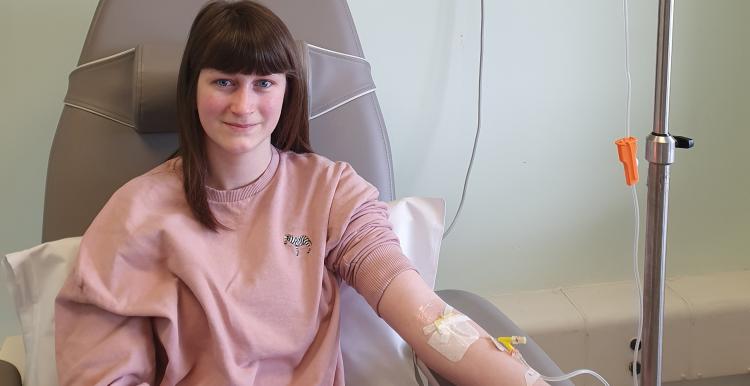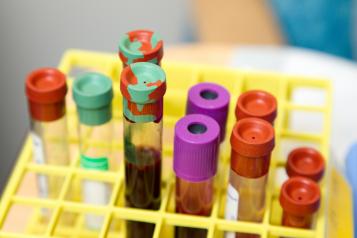Plasma donors needed in London - lack of awareness after 23 year gap

Plasma donation only restarted in April after a gap of more than 20 years and few people know what plasma donation is. An NHSBT survey shows only 23% of the public know about it. (1)
This lack of awareness is contributing to a shortfall in donors. There are:
· 638 active plasma donors at the Croydon plasma donor centre, compared to the 1,050 needed by now.
· 1,035 active donors at the Stratford donor centre, compared to the 1,400 needed by now.
· 1,069 active donors at the Twickenham donor centre, compared to the 1,400 needed by now.
Targets are rising as the programme expands. In total, NHSBT needs 4,600 people to start donating plasma in London in the next three months. (1,300 at Croydon, 1,700 at Stratford, and 1,600 at Twickenham). Last year, 3,905 people from London received antibody medicines made from plasma.
Natalie Beeton from Borehamwoood relies on antibody medicines to protect her from serious illness and help keep her alive. The 26-year-old from Borehamwood has an immunodeficiency that means she can’t protect herself infections. Natalie has an infusion of immunoglobulins every six weeks at the Royal Free in London. Doctors think her immune system was badly damaged by a serious case of glandular fever.
“It pretty much killed my immune system,” she said.
She was left with a shortage of IgG, the most common antibody, which protects against bacterial and viral infections. She also had immune thrombocytopenia as a child, where the immune system kills the body’s platelets.
Doctors think her medical history means there is an underlying cause and she is going through tests for common variable immune deficiency (CVID). This is a primary immunodeficiency, though to have a genetic basis, where people can’t produce enough antibodies and are at greater risk from infectious diseases. She started getting transfusions in July 2019. Natalie, an underwriter for a financial company, said: “I was at constant risk of serious infections because my immune system could not stop anything.
“After I started getting IgG felt like I had a new lease of life.
“I would really encourage people to donate – you don’t know what difference it will make.
“My illness is long term and I am going to need this medicine for the rest of my life. Your donations will be the juice that keeps me going.”
Lynda Rhodes, 68, of Hornchurch, had decades of repeated infections before a diagnosis and treatment with antibody medicine changed her life. She had bronchitis, ear and eye infections, urinary tract infections, fungal infections, stomach upsets and joint pain. Between 2002 and 2008 her health became even worse. She spent three weeks in hospital with pneumonia in 2004 and was regularly readmitted with various problems. In 2008, Lynda was diagnosed with common variable immune disorder, which meant she lacked the antibodies to fight infections, and she was put on regular immunoglobulin treatment.
“I immediately noticed the difference,” she said. “There were no more hospitalisations after that first full intravenous immunoglobulin treatment.
“I was able to come off a number of medications and gradually began to feel better.”
Lynda still has complications but said: “Although I am still prone to infection, I can breathe, and I can walk and speak at the same time. I’m better health wise now than I’ve been most of my life, thanks to immunoglobulins.
“With the pressure on world supplies plasma, knowing we are collecting our own is fantastic. Not knowing if there is enough is constantly on our minds, the fear that comes from the core of you is hard to describe. If you are asked to donate your plasma please sign up, you really are saving lives.”
To recruit the lifesaving donors needed, NHSBT is working with partners and running a campaign with a call to ‘join the donor pool’ over the summer, asking people who may not be able to enjoy a holiday to help build the pool of active donors. NHSBT will be working with national and local partners to drive new donors to the 11 new plasma donor centres. (2) The campaign will include educational content on what plasma donation is. There was a ban on using plasma from UK donors for these medicines from 1998 to February 2021, as a vCJD safety precaution. The independent experts of the MHRA concluded it could safely be restarted.
Donated plasma is made into antibody medicines known as immunoglobulins, which are used to save the lives of people with immune disorders. Around 17,000 people a year receive these medicines. They are mainly used to treat immunodeficiencies (for example, when people lack antibodies to fight infections) and neurological disorders (for example, when the body’s immune system is attacking itself). (3)
Currently the NHS depends entirely on imports of blood plasma from other countries – mainly the US – to manufacture immunoglobulins. Donation to NHSBT will bolster long term NHS supplies. The plasma being donated to NHSBT now will reach hospitals from 2022 onwards, following a manufacturing process to turn it into a medicine. Henry Jarvis, Twickenham Donor Centre Manager, said: “After a gap of more than 20 years it’s understandable that not many people in London know about plasma donation.
“Now we need the public’s help to expand our pool of plasma donors and meet the targets which will help make England more self-sufficient in the supply of these lifesaving medicines.
“We particularly want to hear from men because they’re more likely to be able to donate. “Please support this campaign and donate plasma at our centre - you will save lives.”
To donate plasma, visit www.blood.co.uk/plasma or call 0300 123 23 23.
ENDS
Press Office Contact
Contact the NHSBT press office on 01923 367 600 or pressoffice@nhsbt.nhs.uk
Notes to Editors
(1) Awareness of Plasma for Medicine stands at 23% among the 16+ population in England. NHSBT Survey respondents May 2021 (2192 people).
(2) There are plasma donor centres in Barnsley, Birmingham, Bolton, Bristol, Croydon, Chelmsford, Manchester, Reading Stratford, Stockton, Twickenham.
(3) Examples of immunodeficiencies treated with immunoglobulins include; genetic disorders where the body can’t make antibodies, and when someone has a damaged immune system from a virus or aggressive cancer treatment. Examples of neurological disorders treated with immunoglobulins include Guillain Barre syndrome and myasthenia gravis. Immunoglobulins also used for a wide array of haematological and other illnesses, such as kawasaki disease, immune thrombocytopenic purpura, and haemolytic disease of the foetus and newborn
NHSBT Notes
NHS Blood and Transplant is a joint England and Wales Special Health Authority. We provide the blood donation service for England and the organ donation service for the UK. We also provide donated tissues, stem cells and cord blood. We are an essential part of the NHS, saving and improving lives through public donation.
